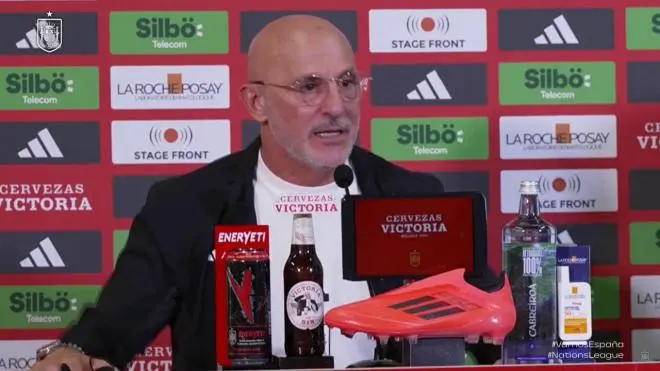
In the football world, debates over the football calendar have intensified as injuries plague players across the globe. Spanish national team coach Luis de la Fuente has faced criticism over the frequency of international fixtures, but he found an unexpected ally in Barcelona’s sporting director Deco, who recently defended him in an interview.
Table of Contents
The Rising Concerns Over the Football Calendar
As the season kicks off, the issue of player injuries has become more pressing. Big names such as Rodrigo Hernández and Dani Carvajal have suffered serious injuries, fueling the debate about the intense scheduling of football matches. The introduction of tournaments like the Nations League has added more games to the calendar, a development that some argue increases the risk of injuries. De la Fuente, though criticized for his stance, defended the current schedule, stating that national teams are just as important as clubs.
Deco’s Support for De la Fuente
Deco, a former Barcelona star and now sporting director, expressed his support for De la Fuente in an interview. “The issue with the national teams isn’t the coach’s fault,” Deco remarked, referencing De la Fuente’s comments on the demands placed on players by the Nations League. Deco elaborated, “There used to be fewer official games, but now every game feels like a final.” According to Deco, this issue requires deeper analysis, but he sympathizes with De la Fuente, acknowledging that international games are part of the football ecosystem that can’t be ignored.
Lamine Yamal: A Rising Star Under De la Fuente’s Leadership
Deco also praised De la Fuente for his management of young talents, particularly Lamine Yamal, who has recently burst onto the scene with Barcelona. After the game against Denmark, De la Fuente made the decision to rest Yamal, showcasing his careful handling of the 16-year-old sensation. Deco compared Yamal’s emergence to Leo Messi‘s early days, noting that Yamal’s rise comes during a period of transition for both Barcelona and Spain.
“Messi had the advantage of joining a team that was already winning, but Lamine Yamal is part of a new generation that’s being built,” Deco stated. He emphasized the importance of managing Yamal’s development carefully, ensuring he isn’t overburdened at such a young age.
The Messi-Yamal Comparison: A Delicate Balance
The parallels between Lamine Yamal and Leo Messi are unavoidable, but as Deco pointed out, there are key differences. Yamal has been thrust into the spotlight from the very beginning, while Messi was gradually integrated into the starting lineup by Frank Rijkaard over a couple of years. “Messi became a regular in the team after about a year and a half,” Deco explained, “but Lamine has been a first-team player from day one.”
Deco’s observations highlight the challenges that come with nurturing young talent while managing the pressures of modern football.
Managing Player Rotation Amid a Grueling Schedule
The demanding football calendar is not just a concern for young players like Yamal. Established stars like Rodrigo Hernández and Dani Carvajal have already fallen victim to injury, and the impact of fixture congestion is being felt throughout Europe. According to Deco, clubs and national teams alike need to find a balance between maximizing player performance and ensuring their well-being.
“We must remember that injuries are part of the game,” Deco said, “but with more matches, especially in tournaments like the Champions League and international competitions, we’re seeing more serious injuries.” The need for smarter player rotation is a topic that has sparked much debate, particularly as managers face increasing pressure to win both club and international trophies.
Preparing for El Clásico: The Resting of Lamine Yamal
Deco’s interview also touched on the upcoming El Clásico, a fixture that captures the world’s attention every year. Yamal’s recent exclusion from the Spanish squad was seen by some as a move to keep him fresh for the Real Madrid clash. Deco neither confirmed nor denied this, but did emphasize the importance of rest and recovery for young players in such high-stakes games.
“El Clásico is a big match,” Deco commented, acknowledging the significance of the clash between Barcelona and Real Madrid, particularly with the added pressure of the Champions League just around the corner.
The Challenge of Balancing International and Club Commitments
The debate over the balance between club and international commitments continues to grow as more players succumb to injury. Coaches like De la Fuente must walk a fine line between meeting the demands of national team duties and managing the fitness of their squad members. Deco’s remarks suggest that the issue goes beyond individual coaches and requires a broader reassessment of the football calendar.
“We’re in a situation where every match is crucial, whether it’s for club or country,” Deco reflected, “and this puts an enormous strain on the players.”
Conclusion: The Road Ahead for Football Scheduling
The football community is increasingly aware of the challenges posed by the current football calendar, and the discussions surrounding player welfare are unlikely to fade any time soon. With Deco’s support, Luis de la Fuente has highlighted the need for a collaborative approach to address these challenges. The balance between club and international football, especially in light of tournaments like the Nations League and Champions League, remains a pressing issue.
As the season progresses, the spotlight will remain on players like Lamine Yamal and how they are managed amidst the demands of modern football. For now, both De la Fuente and Deco seem committed to finding the best way forward, even as the intense fixture schedule continues to push players to their limits.







